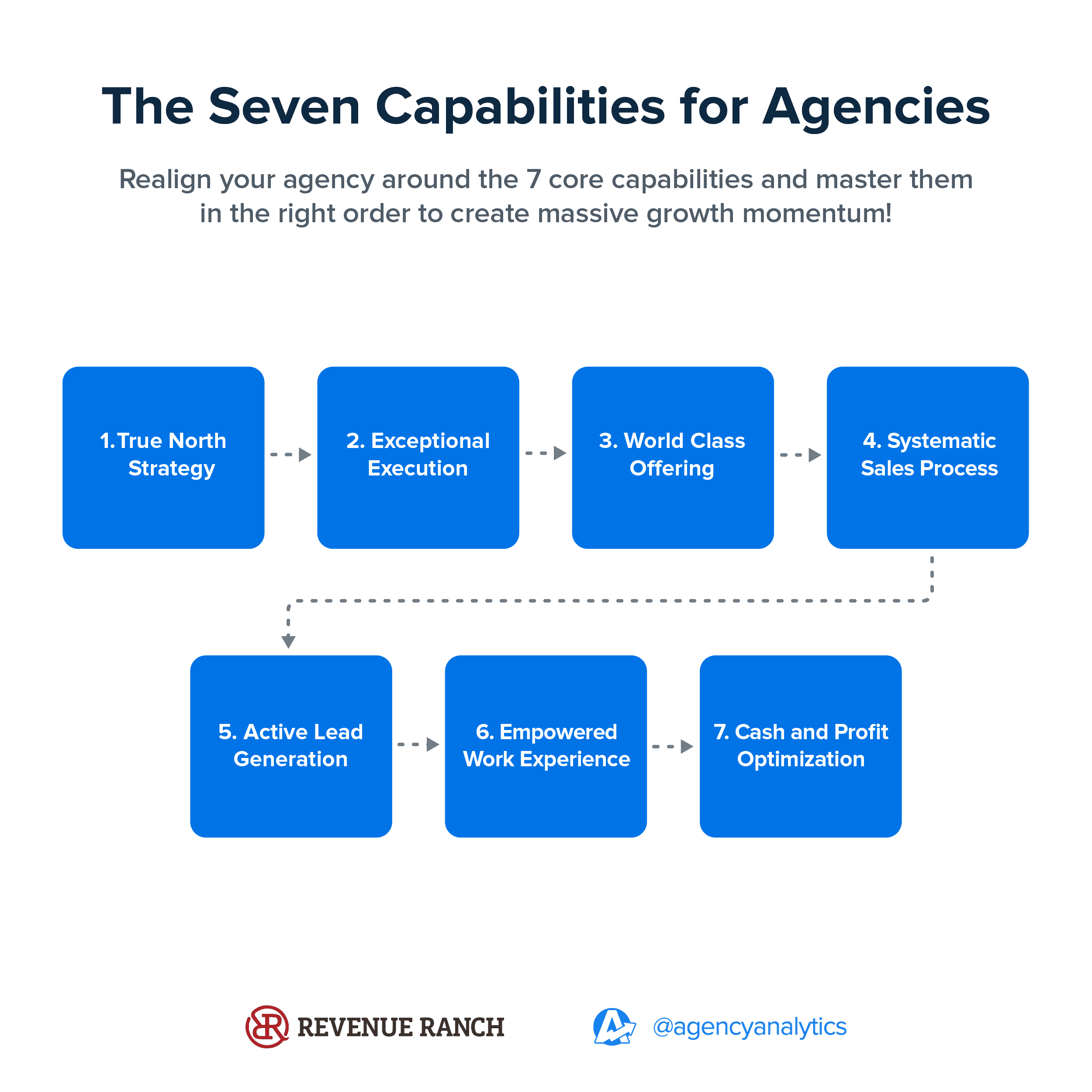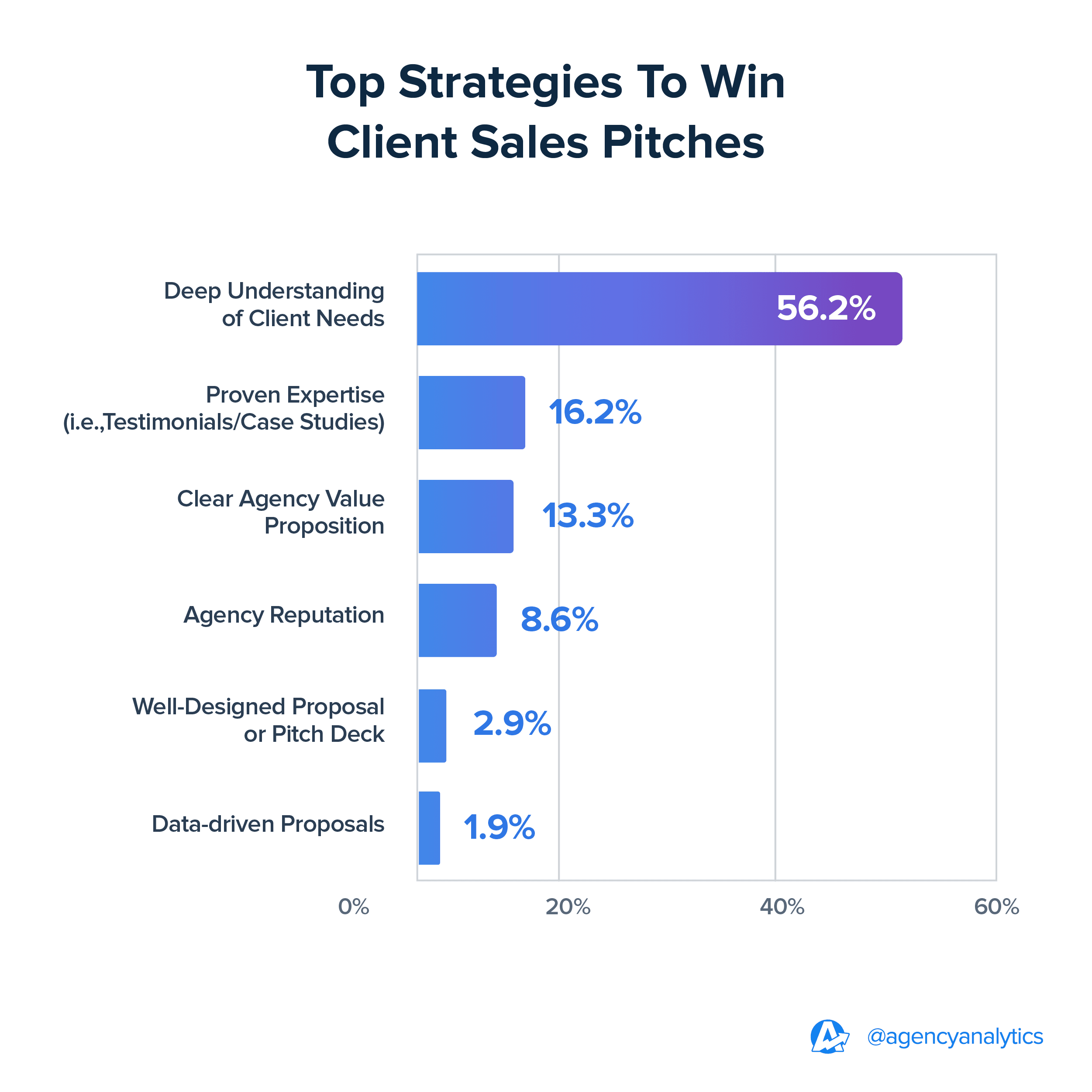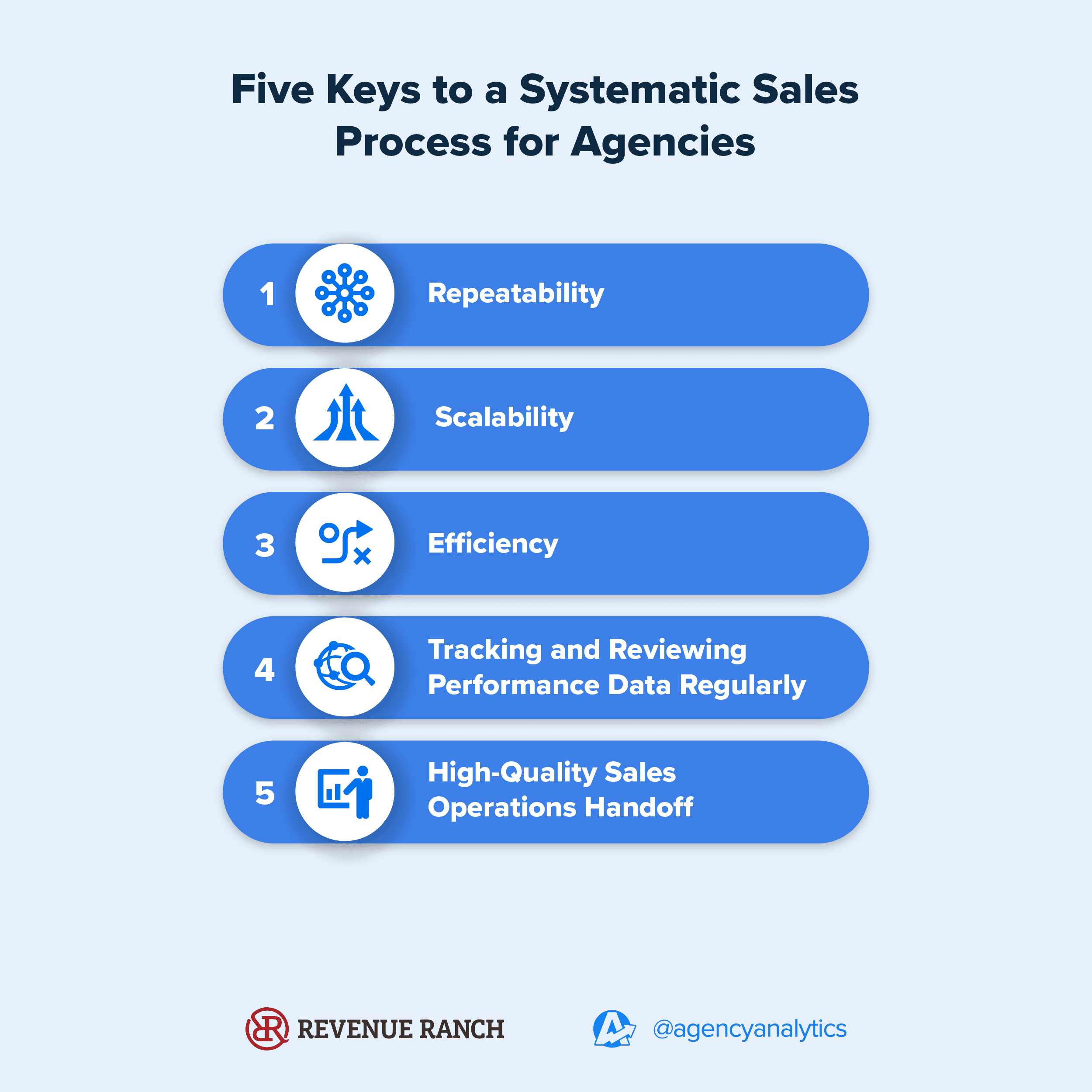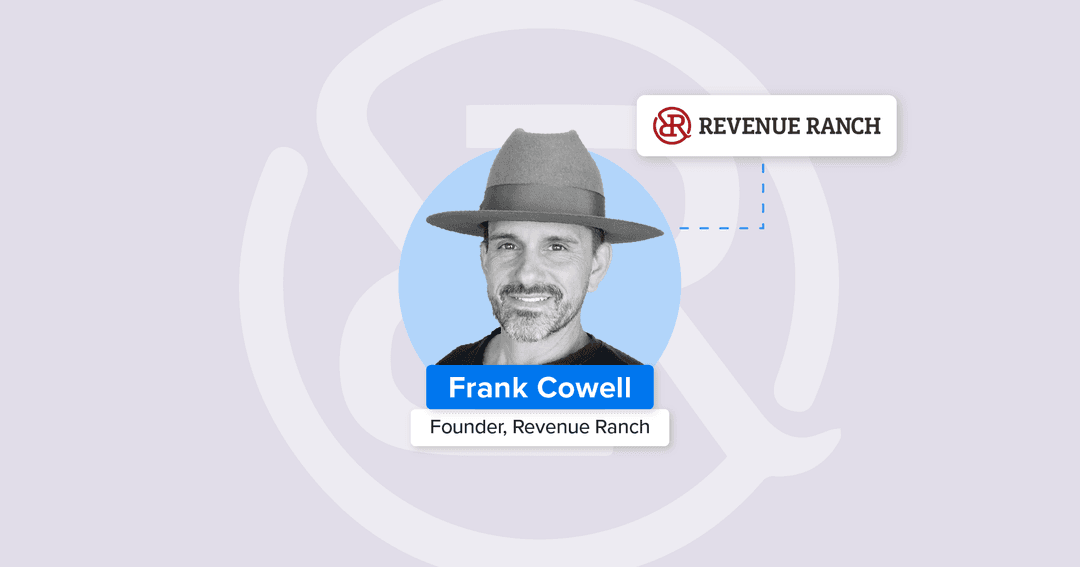Table of Contents
Table of Contents
- What is the Systematic Sales Process, and Why Does It Matter for Agencies?
- How the Systematic Sales Process Fits Within the Seven Capabilities Framework
- Why a Systematic Sales Process is Crucial for Agency Growth
- The Five Keys to a Systematic Sales Process for Your Agency
- How One Agency Doubled Close Rates by Systemizing Sales
- Building a Future-Ready Sales Process
7,000+ agencies have ditched manual reports. You can too.
Free 14-Day TrialQUICK SUMMARY:
A streamlined sales process can be the difference between growth and burnout for agency founders. In this guide, discover why a Systematic Sales Process is essential to sustainable growth, and explore actionable steps to implement it within your agency—freeing you to focus on strategy while your team closes quality deals.
In the world of agency growth, there’s no shortage of challenges, especially when it comes to building an effective sales process that doesn’t hinge on the founder's every move.
This is where Frank Cowell’s Seven Capabilities Framework provides a guiding light for agency leaders. Designed for businesses looking to scale, the framework identifies essential capabilities for sustainable, repeatable growth.
In a recent conversation, Frank and I explored one of the framework’s critical components: the Systematic Sales Process.
As the fourth of seven capabilities, this process sits at the core of a successful agency’s revenue engine. It’s more than just a sales methodology for closing deals—it’s about creating a consistent, team-driven approach that supports long-term growth and frees up the founder’s time.
Let’s dive into how the Systematic Sales Process plays a pivotal role within the Seven Capabilities Framework and why it’s essential for agency leaders aiming to build momentum and scale.
What is the Systematic Sales Process, and Why Does It Matter for Agencies?
In the Seven Capabilities Framework, the Systematic Sales Process stands out as a critical component for agencies aiming to scale. This isn’t just about setting up sales calls or following up with leads. Instead, it’s about developing a reliable, repeatable sales processes system that consistently closes quality clients—even when the founder isn’t directly involved in every deal.
If you have a sales process that doesn’t predictably close at a high rate, or if a founder is required to close almost every deal, then you don’t have a Systematic Sales Process.
Frank Cowell, Founder, Revenue Ranch
Switching to a Systematic Sales Process allows agency founders to shift from being the “superhero” in every deal to empowering a sales force that runs the entire sales process independently.
Frank identifies five core attributes of a successful Systematic Sales Process: repeatability, scalability, efficiency, tracking, and a quality sales-to-operations handoff.
Each of these attributes ensures the sales cycle is effective and sustainable in the long term. With a systematic approach in place, agencies are less reliant on the founder and focus on quality over quantity, prioritizing the right fit clients who are more likely to stay and grow with the agency.
The impact? Founders transitioning to a systematic approach free up their time and energy, allowing them to focus on strategic initiatives.
How the Systematic Sales Process Fits Within the Seven Capabilities Framework
To fully understand the role of the Systematic Sales Process, it’s essential to see how it fits within Frank’s larger framework—the Seven Capabilities. This framework outlines the key areas that agencies must develop to grow sustainably.
According to Frank, the Seven Capabilities are designed to be implemented in a specific order, starting with the foundations of the business and then building toward a revenue engine.
The framework begins with True North Strategy and Exceptional Execution, which form the foundation for any business, guide the agency’s direction, and ensure consistent, high-quality delivery across all functions.

Once the agency’s direction has been defined, it’s time to rev up what Frank calls the “Revenue Engine”—a World-Class Offering, a Systematic Sales Process, and Active Lead Generation.
Within this sequence, each capability serves as a building block, ensuring that when lead generation ramps up, it flows into a well-oiled machine primed to close deals with the right clients.
If we think about the flow of how clients experience your organization, they experience your marketing, which is meant to generate leads. Then they experience your sales team, which is the sales process meant to convert them. And then they experience your offering. That's the chronological flow.
But to optimize, we optimize in reverse. That's how we create the most momentum possible. If we don't have a world-class offering, then why are we obsessed and concerned about generating leads? Because then we're sending it into a system that's not optimized: a leaky bucket.
Frank Cowell, Founder, Revenue Ranch
By developing a strong sales process before focusing on lead generation, agencies avoid wasting time and money on leads that won’t convert or that result in poor-fit clients. Systematic sales efforts ensures the agency will handle increased demand smoothly when lead generation efforts scale up.
Why a Systematic Sales Process is Crucial for Agency Growth
The Systematic Sales Process is a core element in what Frank calls the Growth Momentum Method. It helps agencies evolve beyond the founder-led model and ensures that the sales process is consistent and reliable.
Why does this matter? For agencies, growth often comes with the challenge of scale. Many founders start out doing everything themselves, which may work out fine in the early stages. However, when it’s time to bring in more clients and delegate responsibilities, the founder’s involvement in every deal becomes a bottleneck.
When we say scalable, we mean making sure the content within that process and the product being sold in that process don't require a superhero like the founder. If what you're selling has a standardized process, but the product is so complex that you need the founder to close the deal, then it's not very scalable.
Frank Cowell, Founder, Revenue Ranch
This is where the Systematic Sales Process becomes crucial. By creating a structured, predictable process, agency owners gradually step back from day-to-day sales, empowering their sales reps to handle sales with the same level of consistency.
Frank describes the process as a way to build mutual success—success for both the agency and its clients. By establishing a sales process that aligns with the agency’s core values and goals (the True North), you build relationships with clients who are the right fit. This helps set up both your agency and its clients for long-term success.

Winning clients starts with understanding their needs from the very first interaction. According to our latest Marketing Agency Benchmarks Survey, 56% of agency leaders say understanding client needs is key to turning prospects into loyal customers.
The Five Keys to a Systematic Sales Process for Your Agency
For agency leaders, the idea of a Systematic Sales Process is only as valuable as its practical application.
Frank outlines five essential attributes that agencies should incorporate into their sales systems: repeatability, scalability, efficiency, tracking and reviewing performance data regularly, and a high-quality sales operations handoff.
These attributes ensure that sales don’t rely on individual “superheroes” but rather follow a structured, team-oriented path to secure quality clients.

1. Repeatability To Build a Consistent Sales Journey
A repeatable process means that every prospect receives the same seamless experience, from the first interaction through to signing a contract.
Frank suggests defining five primary stages within the sales journey: evaluation, discovery, planning, presentation, and contracting. Each stage should be carefully documented, with clear requirements and standardized assets.
To operationalize this process, Frank recommends using technology to make the process easy to follow. Automation can support consistency by ensuring that specific steps are always taken and that documentation (like an SOP) is in place.
2. Scalability To Empower the Team Beyond the Founder
Scalability ensures that the agency’s growth isn’t tied to the founder’s direct involvement in every deal. This involves creating a system that doesn’t rely on the founder’s unique expertise but rather enables any trained team member to close deals.
Building scalability includes providing ongoing training, role-playing, and shadowing opportunities so team members feel confident in the process.
3. Efficiency To Maximize Close Rates With Ideal Clients
Efficiency in the Systematic Sales Process means that the agency is closing deals at a high rate and focusing on clients who are a good fit. Frank emphasizes that “your close rate is a direct measurement of efficiency” and recommends using the evaluation step to filter out clients who don’t align with the agency’s ideal client profile (ICP).
By advancing only those who are a strong match, agencies improve close rates and avoid spending time on prospects who are less likely to succeed with the agency.
To keep the process efficient, Frank advises creating a culture where team members don’t move prospects forward unless they meet established criteria. This leads to a streamlined sales pipeline that supports agency growth and boosts team morale.
4. Tracking and Reviewing Performance Data Regularly To Optimize Sales
Tracking performance data regularly is essential to refine the sales process.
Key performance indicators (KPIs) like contract value and the number of new clients are the main outcomes to measure, but Frank also suggests monitoring supporting metrics. These could include close rate, pipeline value by stage, and outreach attempts.
Frank explains that these metrics are “your tools to investigate” when KPIs fall short. Leading indicators provide early signals for potential adjustments, while lagging indicators allow agencies to assess long-term success.
Regular reviews of these metrics enable sales teams to stay agile, identify trends, and continually optimize the process.
5. A High-Quality Sales Operations Handoff To Start Every Client Relationship Strong
A smooth handoff from sales to operations sets the stage for a successful client relationship.
Frank advises scheduling an internal handoff meeting within a specific time frame after the deal closes. The meeting should involve the salesperson and the client’s main point of contact (e.g., an account manager or customer success representative).
During this meeting, the salesperson should review and include key details, such as client background, the presentation deck used during the sale, and the contract/service agreement containing the scope of services.
By operationalizing this handoff process—using automated tasks and templated agendas in the CRM—agencies ensure a consistent client experience every time.
Impress clients and save hours with custom, automated reporting.
Join 7,000+ agencies that create reports in under 30 minutes per client using AgencyAnalytics. Get started for free. No credit card required.
Already have an account?
Log inHow One Agency Doubled Close Rates by Systemizing Sales
Frank shares a compelling example of a client who achieved remarkable success by implementing a systematic approach.
Initially, this agency owner was the “hero” of the sales process, personally managing nearly every step. This approach had its limits: while the agency could close deals, it struggled with scalability, often taking on clients who weren’t ideal fits and underselling their services.
Frank recalls that although the agency had a process in place, it was loosely defined, and success depended on the founder’s involvement and expertise.
The turning point came when the agency committed to a Systematic Sales Process. This shift in approach allowed the agency to filter for high-fit clients from the very start, focusing only on prospects aligned with the agency’s ICP.
The result? A significant improvement in both close rates and contract value. “He was actually able to spend his time working with the best prospects,” Frank says. “He was closing deals at 2x his previous price points.”
By following a standardized, repeatable process, the agency’s close rate and average contract value surged. Within just seven months, they were on track to achieve 150% growth over the previous year’s sales volume—all while reducing the founder’s direct involvement in day-to-day sales.
With a proper system in place, your sales actually improve, even if your prices are higher.
Frank Cowell, Founder, Revenue Ranch
Building a Future-Ready Sales Process
For agencies aiming to scale, a Systematic Sales Process is more than just a sales tactic—it’s a cornerstone of sustainable growth. By focusing on consistency, scalability, efficiency, tracking, and a smooth handoff to operations, agency leaders transform sales from a founder-led bottleneck to a streamlined, team-driven process.
As we’ve seen, implementing a Systematic Sales Process allows agencies to filter for ideal clients, maximize close rates, and deliver a high-quality experience from Day One.
When you pair the right clients with the right solution delivered by the right team, your business is unstoppable.
Frank Cowell, Founder, Revenue Ranch
Building a Systematic Sales Process is the first step toward a scalable future. With the right structure and commitment, your agency will achieve the kind of predictable, sustainable growth that frees you, the founder, to pursue your vision and empower your team to succeed.

Written by
Francois Marchand brings more than 20 years of experience in marketing, journalism, content production, and artificial intelligence (AI). His goal is to equip agency leaders with innovative strategies and actionable advice to succeed in digital marketing, SaaS, and ecommerce.
Read more posts by Francois MarchandSee how 7,000+ marketing agencies help clients win
Free 14-day trial. No credit card required.






